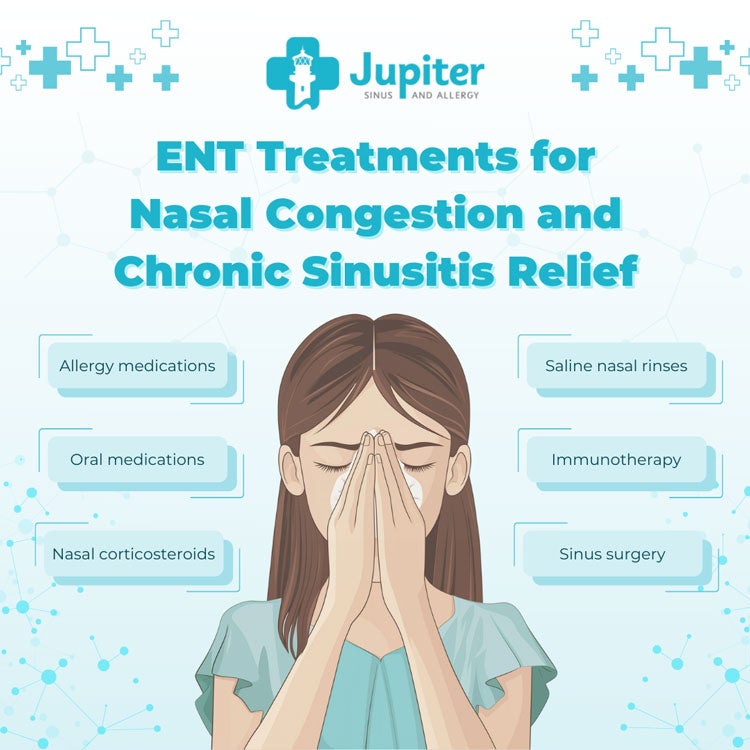ENT Treatments for Nasal Congestion and Sinusitis
Persistent nasal congestion is often a sign of chronic sinusitis—a condition caused by inflammation and swelling of the sinus linings, typically due to an infection. When these linings become inflamed, it disrupts the normal drainage of mucus, leading to a buildup and a constant stuffy feeling.
Breathing through the nose can become difficult, and you may experience pressure or tenderness around the cheeks, eyes, and forehead.
If a sinus infection lasts longer than 12 weeks, it may be diagnosed as chronic sinusitis.

What Are the Symptoms of Chronic Sinusitis?
Here are the common symptoms of chronic sinusitis:
- Nasal congestion, making it difficult to breathe through the nose
- Facial pain or pressure that gets worse when you move your head or bend over
- Pain or pressure around the nose, eyes, cheeks, and forehead
- Ear pain or pressure
- Pain in the teeth
- Runny nose with thick green or yellow nasal discharge
- Decreased sense of taste or smell
- Postnasal drip
- Halitosis (bad breath) or a foul taste in your mouth
- Headache
- Cough
- Fatigue or tiredness
How Is Chronic Sinusitis Diagnosed?
An ENT specialist can diagnose chronic sinusitis by performing a physical exam and assessing your symptoms. Your doctor might use a thin, flexible tool called an endoscope to look into the nose. This will allow them to see inside the sinuses and assess the inflammation. They might order imaging tests like CT or MRI scans to get more detailed imaging of your sinuses. If allergies are a factor in your case of chronic sinusitis, they may also conduct an allergy test.
Treatments for Chronic Sinusitis and Nasal Congestion
A consultation with an ENT specialist will guide you through the best treatment options for your needs. These may include:
Allergy Medications
If your case of sinusitis is caused by allergies, your doctor might prescribe allergy medications to manage the symptoms and prepare your immune system for peak allergy season.
Oral medications
Several oral medications may be prescribed to help reduce the inflammation of the sinus linings.
- Antibiotics may be prescribed for sinusitis caused by a bacterial infection.
- Decongestants can thin mucus and encourage proper drainage, getting rid of chronic nasal congestion.
- Pain relievers can be beneficial in managing common symptoms like headaches and facial pain and pressure
Nasal Corticosteroids
Nasal corticosteroids are nasal sprays that can reduce the swelling and inflammation of the sinus linings, encouraging proper mucus drainage.
Saline Nasal Rinses
Saline nasal rinses are a popular home remedy for targeting nasal congestion and mucus buildup. These can effectively clear blocked sinuses and improve breathing through the nose.
Immunotherapy
If allergies cause or worsen sinusitis, your care provider might recommend immunotherapy. Immunotherapy treatments include allergy shots or allergy drops. Either way, both treatment plans will train your immune system to be less reactive to your allergens by introducing small amounts of these allergens into your system via injection or mouth drops.
Sinus surgery
For chronic sinusitis cases that don’t clear up or resolve with treatment, your doctor might offer sinus procedures for symptom relief. These procedures might include:
- Balloon sinuplasty is an outpatient procedure that can provide lasting relief from several chronic sinusitis symptoms, including nasal congestion. The procedure starts by inserting a small balloon catheter into the nose. Then, your doctor will gently inflate this balloon. This works to enlarge the patient’s sinus passages and restore proper mucus drainage. It’s minimally invasive and has a quick recovery time.
- FESS (Functional Endoscopic Sinus Surgery) is a minimally invasive procedure that uses an endoscope to remove the diseased areas within the sinuses and nose. It uses great precision and will not risk the other healthy issues surrounding the target areas. This is often recommended for patients who have deviated septums and nasal polyps. It is also often the next step if balloon sinuplasty doesn’t work.
Get in Touch With Jupiter Sinus and Allergy for Effective Sinusitis Treatments
Chronic sinusitis and persistent nasal congestion can be bothersome. Moreover, dealing with them can quickly impact the quality of your life and render you unable to work or study. At Jupiter Sinus and Allergy, we are deeply committed to providing diagnosis and personalized treatment plans for patients who don’t want to suffer anymore. Get in touch with our team today and embark on your journey towards healthy sinuses!
This blog is for informational purposes only and should not be considered medical advice. Always consult a licensed healthcare professional regarding any medical condition or treatment.
The information provided in this article is for informational and educational purposes only and does not constitute medical advice. It is not intended to diagnose, treat, cure, or prevent any disease or medical condition. Always seek the guidance of your physician or other qualified healthcare provider with any questions you may have regarding a medical condition or treatment.
Results may vary: Treatment outcomes and health experiences may differ based on individual medical history, condition severity, and response to care.
Emergency Notice: If you are experiencing a medical emergency, call 911 or seek immediate medical attention.


